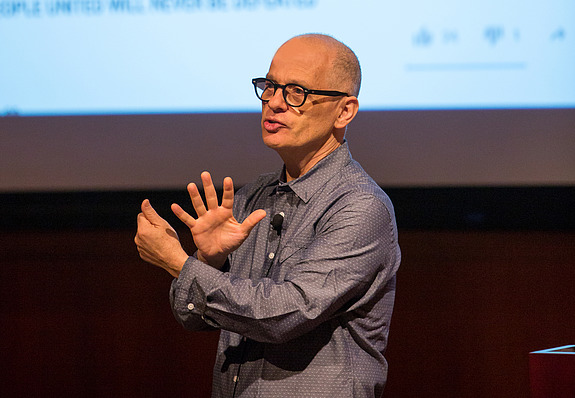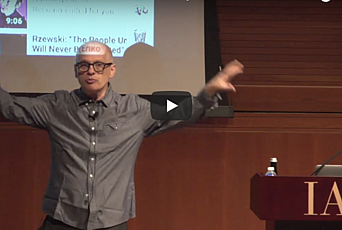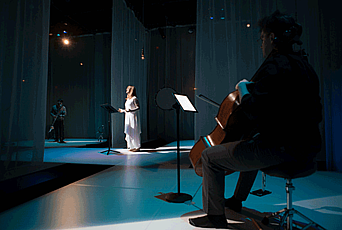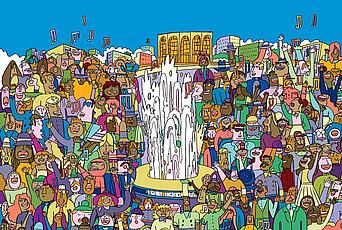IAS Renews Appointment of David Lang as Artist-in-Residence for Three-Year Term
Press Contact

The Institute for Advanced Study announces a new term of residency for Pulitzer Prize–winning composer David Lang. His second term as Artist-in-Residence will proceed through June 2022, during which time he will seek to understand the parallels that exist between creators and observers in various contexts of exceptional talent. As part of his residency, Lang will pursue his creative work as part of the Institute community in an exploration of mastery, meaning, and experience. Lang will also present a series of talks and curate the 2019–20 Edward T. Cone Concert Series, all connected by the theme of VIRTUOSITY.
“I am so honored and happy to be reappointed as Artist-in-Residence at the Institute,” stated Lang. “I have enjoyed every second of my time there—being part of a community of eminent scholars and scientists, programming music and art events, having both the support and the privacy to do my own work. It has been great for me personally, but it is also an honor to my field, that the most distinguished thinkers in the world have all agreed that music needs to be a part of their lives. I am very excited that I will be able to be a part of it for another three-year term.”
Since music began, musicians have thrilled listeners by performing seemingly impossible musical tasks, right before the eyes of the audience. Music that asks performers to play faster, or higher, or to conquer some obviously impossible hurdle is usually thought of as “virtuosic.” The VIRTUOSITY series of concerts will examine the relationships between composer, performer, and listener as revealed through the performance of virtuosic music.
“David’s artistry brings a unique vitality to the Institute, and we are delighted to welcome him for another three-year term as Artist-in-Residence,” stated Robbert Dijkgraaf, Director and Leon Levy Professor. “As scientists and scholars work to elucidate the mysteries of the universe and human thought, Lang’s musical vision transcends boundaries, unlocking creativity and a mindful exploration of space, time, and sound.”
The schedule for the 2019–20 season is as follows:
- October 4 & 5: Meredith Monk & Vocal Ensemble
- November 15 & 16: Conrad Tao
- January 31 & February 1: Vicki Ray and FLUX Quartet
- March 13 & 14: Benjamin Bagby
Lang’s most recent opera, prisoner of the state, with libretto by Lang, was described by Opera News as, “a dialogue with Beethoven, resonating across the centuries.” prisoner was co-commissioned by the New York Philharmonic, Rotterdam’s de Doelen Concert Hall, London’s Barbican Centre, Barcelona’s l’Auditori, Bochum Symphony Orchestra, Bruges’s Concertgebouw, and Malmo Opera in Sweden, and premiered June 6–8, 2019 in New York City, conducted by Jaap van Zweden. Other works by Lang include his opera the loser, which opened the 2016 Next Wave Festival at the Brooklyn Academy of Music, and for which Lang served as composer, librettist and stage director; the public domain for 1000 singers at Lincoln Center’s Mostly Mozart Festival; and his chamber opera anatomy theater at Los Angeles Opera and at the Prototype Festival in New York. In 2008, Lang received the Pulitzer Prize for his composition the little match girl passion and received Academy Award and Golden Globe nominations, among others, for the music to Paolo Sorrentino’s film Youth. Lang is also Professor of Music Composition at the Yale School of Music.
Lang’s works are performed around the globe by the BBC Symphony, the International Contemporary Ensemble, Eighth Blackbird, Santa Fe Opera, the New York Philharmonic, the Netherlands Chamber Choir, the Boston Symphony, the Munich Chamber Orchestra, the Kronos Quartet, and many others; and at festivals and venues such as Lincoln Center, the Southbank Centre, Carnegie Hall, the Kennedy Center, the Barbican Centre, the Brooklyn Academy of Music, Tanglewood, the BBC Proms, MusicNOW festival, The Munich Biennale, the Settembre Musica Festival, the Sydney 2000 Olympic Arts Festival, and the Almeida, Holland, Berlin, Adelaide, and Strasbourg Festivals.
2019–20 Edward T. Cone Concert Series
Meredith Monk (Oct. 4 & 5) is recognized as one of the most unique and influential artists of our time. With renowned members of her Vocal Ensemble, Katie Geissinger and Allison Sniffin, composer/performer Monk will offer one of her rare, more intimate concerts reflecting six decades of innovation and awe-inspiring vocal mastery.
Conrad Tao (Nov. 15 & 16) has appeared worldwide as a pianist and composer, and has been dubbed a musician of “probing intellect and open-hearted vision” by The New York Times, who also cited him “one of five classical music faces to watch” in the 2018–19 season. Tao is a recipient of the prestigious Avery Fisher Career Grant, and was named a Gilmore Young Artist—an honor awarded every two years highlighting the most promising American pianists of the new generation. This concert is supported by a grant from the PNC Foundation.
Vicki Ray (Jan. 31 & Feb. 1), Grammy-nominated pianist, is a leading interpreter of contemporary piano music. Known for thoughtful and innovative programming which seeks to redefine the piano recital in the twenty-first century, Ray’s concerts often include electronics, video, recitation, and improvisation. FLUX Quartet, “one of the most fearless and important new-music ensembles around” according to the San Francisco Chronicle, is strongly influenced by the “anything-goes” philosophy of the Fluxus art movement and the spirit to expand stylistic boundaries.
Benjamin Bagby (Mar. 13 & 14), singer, harpist, and director of medieval music ensemble Sequentia, writes about performance practice and teaches widely in Europe and North America. He is currently on the faculty of the Sorbonne University in Paris, where he teaches in the master’s program for medieval music performance practice.
All concerts in the series will take place at 8:00 p.m. in Wolfensohn Hall at the Institute. The concerts are free and open to the public, but tickets must be reserved online. Seating is limited. For further information about tickets and the Artist-in-Residence program, visit www.ias.edu/air.
Support for the 2019–20 concert series is provided by the Edward T. Cone Foundation. The series is named for noted composer, teacher, pianist and author Edward T. Cone, a tireless supporter of the arts and humanities at the Institute and elsewhere.
About the Artist-in-Residence Program
The Artist-in-Residence program was established at the Institute in 1994 to create a musical presence within the Institute community and to have in residence a person whose work could be experienced and appreciated by scholars from all disciplines. Pianist Robert Taub was the first Artist-in-Residence (1994–2001), followed by Jon Magnussen (2000–2007), Paul Moravec (2007–2009), Derek Bermel (2009–2013), and Sebastian Currier (2013–2016). Lang was first named Artist-in-Residence in July 2016.
About the Institute
The Institute for Advanced Study is one of the world's foremost centers for theoretical research and intellectual inquiry. Located in Princeton, N.J., the IAS is dedicated to independent study across the sciences and humanities. Founded in 1930 with the motto "Truth and Beauty," the Institute is devoted to advancing the frontiers of knowledge without concern for immediate application. From founding IAS Professor Albert Einstein to the foremost thinkers of today, the IAS enables bold, nonconformist, field-leading research that provides long-term utility and new technologies, leading to innovation and enrichment of society in unexpected ways.
Each year, the Institute welcomes more than 200 of the world's most promising researchers and scholars who are selected and mentored by a permanent Faculty, each of whom are preeminent leaders in their fields. Comprised of four Schools—Historical Studies, Mathematics, Natural Sciences, and Social Science—IAS has produced an astounding record of introducing new understanding and is responsible for undeniable progress across disciplines and generations, from the development of one of the first stored-program computers to the establishment of art history as a discipline in the United States. Among its present and past Faculty and Members are 33 Nobel Laureates, 42 of the 60 Fields Medalists, and 18 of the 20 Abel Prize Laureates, as well as many MacArthur Fellows and Wolf Prize winners.


